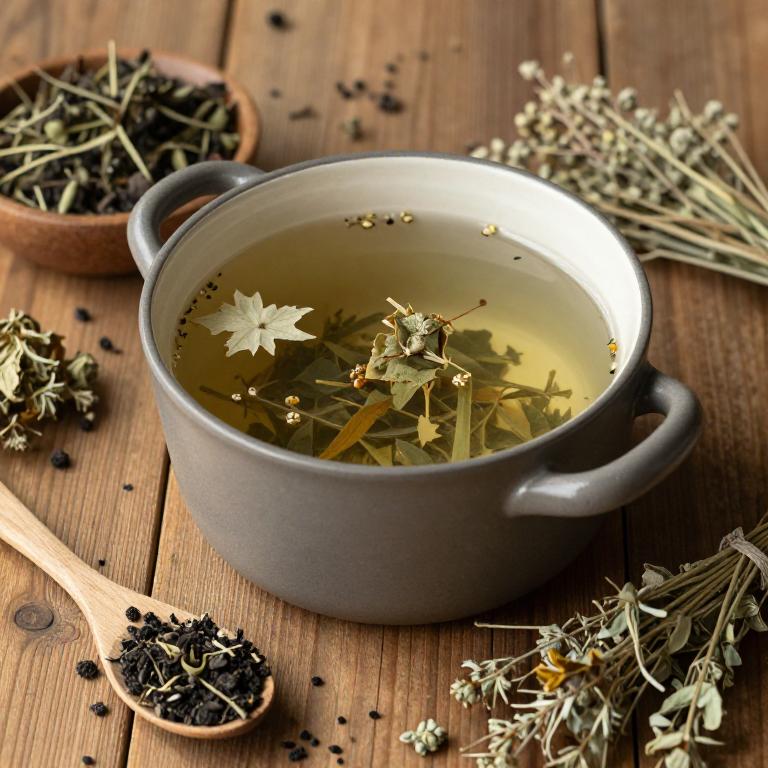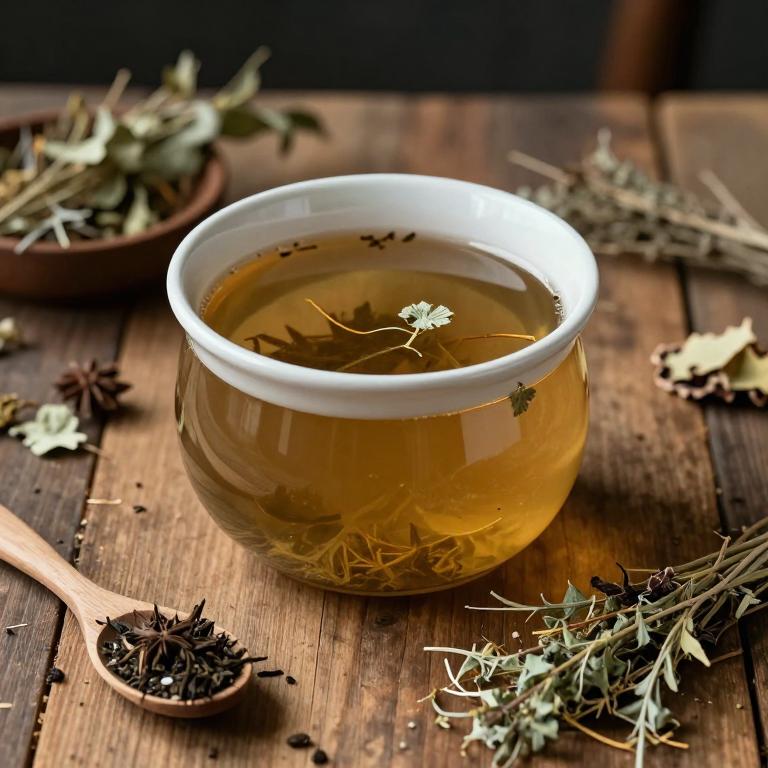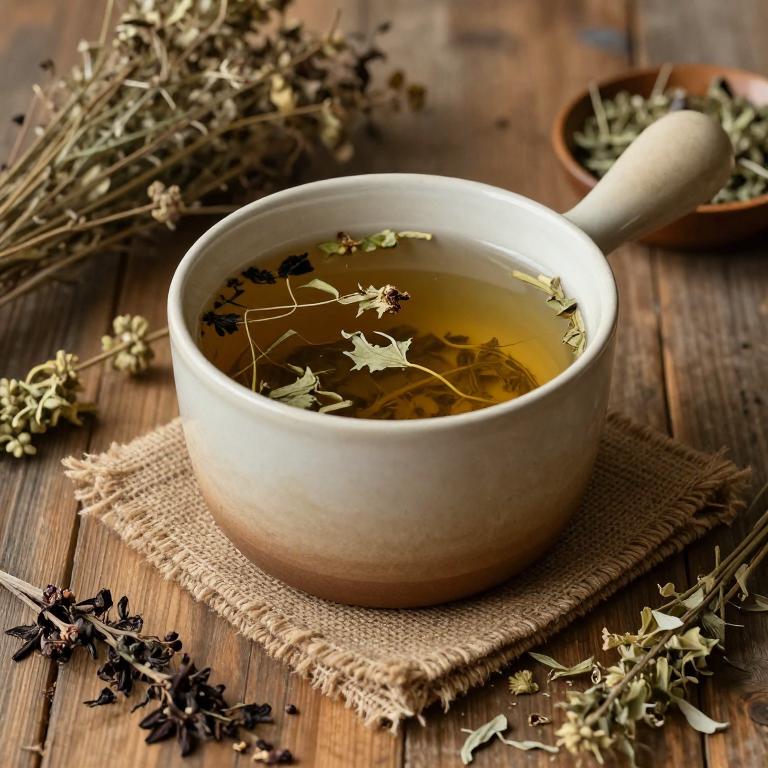10 Best Herbal Decoctions For Osteoarthritis

Herbal decoctions have been traditionally used to alleviate the symptoms of osteoarthritis by promoting anti-inflammatory and analgesic effects.
Commonly used herbs include turmeric, ginger, boswellia, and willow bark, which contain bioactive compounds such as curcumin, gingerol, and salicin. These decoctions are typically prepared by simmering the dried herbs in water for an extended period to extract their active components. They are often preferred for their natural origin and fewer side effects compared to synthetic medications.
However, it is important to consult with a healthcare professional before using herbal decoctions, as they may interact with other medications or have contraindications for certain individuals.
Table of Contents
- 1. Turmeric (Curcuma longa)
- 2. Ginger (Zingiber officinale)
- 3. Thistle (Silybum marianum)
- 4. Common grape (Vitis vinifera)
- 5. Salvia (Salvia officinalis)
- 6. Field horsetail (Equisetum arvense)
- 7. Yarrow (Achillea millefolium)
- 8. Black pepper (Piper nigrum)
- 9. Indian frankincense (Boswellia serrata)
- 10. Ginkgo (Ginkgo biloba)
1. Turmeric (Curcuma longa)

Curcuma longa, commonly known as turmeric, has been widely used in traditional medicine for its anti-inflammatory and antioxidant properties.
Herbal decoctions made from Curcuma longa are prepared by boiling the rhizomes in water to extract the active compounds, particularly curcumin, which is believed to contribute to its therapeutic effects. These decoctions have been studied for their potential to alleviate symptoms of osteoarthritis by reducing joint inflammation and pain. Clinical research suggests that curcumin may inhibit inflammatory pathways such as COX-2 and NF-κB, which are involved in the progression of osteoarthritis.
However, the bioavailability of curcumin is low, and combining it with black pepper or fats can enhance its absorption for better therapeutic outcomes.
2. Ginger (Zingiber officinale)

Zingiber officinale, commonly known as ginger, has been traditionally used in herbal medicine for its anti-inflammatory and analgesic properties.
Herbal decoctions made from fresh or dried ginger roots are often prepared by boiling the rhizome in water to extract its active compounds, such as gingerol and shogaol. These decoctions are believed to help reduce joint pain and inflammation associated with osteoarthritis by inhibiting inflammatory pathways in the body. Preliminary studies suggest that ginger may offer a natural alternative or complementary therapy for managing osteoarthritis symptoms.
However, more rigorous clinical trials are needed to fully establish its efficacy and safety in treating this condition.
3. Thistle (Silybum marianum)

Silybum marianum, commonly known as milk thistle, has been studied for its potential benefits in managing osteoarthritis through herbal decoctions.
The active compound, silymarin, is believed to possess anti-inflammatory and antioxidant properties that may help reduce joint inflammation and oxidative stress associated with osteoarthritis. Herbal decoctions of Silybum marianum are often prepared by simmering the seeds in water, allowing the extraction of beneficial compounds into the liquid. Some preliminary research suggests that these decoctions may support cartilage health and alleviate pain in osteoarthritis patients.
However, more clinical trials are needed to confirm their efficacy and establish standardized dosages for therapeutic use.
4. Common grape (Vitis vinifera)

Vitis vinifera, commonly known as the common grapevine, has been traditionally used in herbal medicine for its potential anti-inflammatory and antioxidant properties.
Herbal decoctions made from the leaves, seeds, and stems of Vitis vinifera are believed to help alleviate symptoms of osteoarthritis by reducing joint inflammation and promoting cartilage health. Studies suggest that compounds such as resveratrol, found in grapes, may inhibit the production of inflammatory cytokines and oxidative stress, which are key factors in the progression of osteoarthritis. These decoctions are often prepared by simmering the plant parts in water for extended periods to extract their active constituents.
While preliminary research shows promise, further clinical trials are needed to fully establish the efficacy and safety of Vitis vinifera decoctions as a complementary therapy for osteoarthritis.
5. Salvia (Salvia officinalis)

Salvia officinalis, commonly known as common sage, has been traditionally used in herbal medicine for its potential anti-inflammatory and analgesic properties.
Herbal decoctions made from the leaves of Salvia officinalis are believed to help alleviate symptoms of osteoarthritis by reducing joint inflammation and pain. Studies suggest that the active compounds in sage, such as rosmarinic acid and flavonoids, may contribute to its therapeutic effects. While some clinical trials show promising results, more research is needed to fully understand its efficacy and safety in treating osteoarthritis.
As a complementary therapy, sage decoctions may be used alongside conventional treatments under the guidance of a healthcare professional.
6. Field horsetail (Equisetum arvense)

Equisetum arvense, commonly known as field horsetail, has been traditionally used in herbal medicine for its purported anti-inflammatory and analgesic properties.
Herbal decoctions of Equisetum arvense are prepared by boiling the dried plant material in water, allowing the active compounds to be extracted into the liquid. These decoctions are often consumed internally to help alleviate symptoms of osteoarthritis, such as joint pain and stiffness. The plant contains high levels of silica and other bioactive compounds that may support cartilage health and reduce inflammation.
However, while some preliminary studies suggest potential benefits, more clinical research is needed to fully confirm its efficacy and safety for osteoarthritis treatment.
7. Yarrow (Achillea millefolium)

Achillea millefolium, commonly known as yarrow, has been traditionally used in herbal medicine for its anti-inflammatory and analgesic properties.
Herbal decoctions of Achillea millefolium may help alleviate symptoms of osteoarthritis by reducing inflammation and pain in affected joints. These decoctions are typically prepared by simmering the dried herb in water for an extended period to extract its active compounds. Some studies suggest that the flavonoids and essential oils present in yarrow may contribute to its therapeutic effects.
However, while anecdotal evidence supports its use, more rigorous clinical trials are needed to confirm its efficacy and safety for osteoarthritis treatment.
8. Black pepper (Piper nigrum)

Piper nigrum, commonly known as black pepper, has been traditionally used in herbal medicine for its potential anti-inflammatory and analgesic properties.
Herbal decoctions made from Piper nigrum are prepared by boiling the dried berries in water to extract their active compounds, such as piperine, which may contribute to its therapeutic effects. Some studies suggest that piperine can enhance the absorption of other anti-inflammatory compounds, potentially improving the efficacy of treatments for osteoarthritis. However, while preliminary research is promising, more clinical trials are needed to confirm its effectiveness and safety in managing osteoarthritis symptoms.
As with any herbal remedy, it is advisable to consult a healthcare professional before using Piper nigrum decoctions as part of a treatment plan.
9. Indian frankincense (Boswellia serrata)

Boswellia serrata, commonly known as Indian frankincense, contains active compounds called boswellic acids that have been shown to possess anti-inflammatory and analgesic properties.
Herbal decoctions made from Boswellia serrata are traditionally used in Ayurvedic medicine to support joint health and alleviate symptoms of osteoarthritis. These decoctions work by inhibiting the production of inflammatory enzymes such as 5-lipoxygenase, which are involved in the progression of joint inflammation. Clinical studies suggest that regular consumption of Boswellia serrata decoctions may help reduce pain and improve mobility in individuals with osteoarthritis.
However, it is important to consult a healthcare professional before using these decoctions, as they may interact with other medications or have side effects in certain populations.
10. Ginkgo (Ginkgo biloba)

Ginkgo biloba, a traditional herbal remedy, has been studied for its potential benefits in managing osteoarthritis due to its antioxidant and anti-inflammatory properties.
Herbal decoctions of ginkgo biloba typically involve simmering the leaves in water to extract bioactive compounds such as flavonoids and terpenoids. These compounds may help improve blood circulation and reduce oxidative stress, which are factors in joint degeneration. Some clinical studies suggest that ginkgo biloba may alleviate pain and enhance joint function in patients with osteoarthritis.
However, more rigorous research is needed to fully understand its efficacy and safety when used as a complementary therapy for this condition.